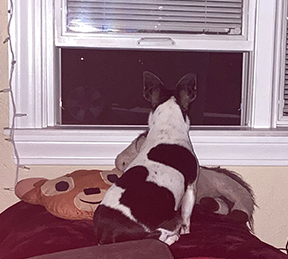Pets in the post-pandemic (away from home) world
Allen McConnell, University Distinguished Professor of Psychology, provides some insights on what pet owners can do to help their furry (or scaly) friends through this transition "back to normal."
As Miami and the rest of the world return to the office and pre-pandemic schedules, our pets are finding themselves alone in empty houses again. Our news team asked Allen McConnell, University Distinguished Professor of Psychology, a few questions about what pet owners can do to help their furry (or scaly) friends through this transition “back to normal.”
McConnell is a social psychologist and an expert on the socially constructed relationships between families and pets. He also researches how nonconscious and conscious feelings and beliefs affect judgment and behavior, how people decode others' nonverbal displays, and the psychology of conservation.
How are pets handling the return to pre-pandemic schedules that take their family members away from home?
This is an interesting question, both in general (i.e., pet-human interactions) and because many of us (my family included) are dealing with this pivot right now.
What we do know is that pets, and dogs in particular, are fairly adaptable and work hard to stay in-tune with their people. So although a dog might show some initial anxiety about a disrupted routine, they are likely to adapt pretty quickly and be happy at 5:30 p.m. when the owner returns from the office.
There’s also a good amount of variability in pets’ personalities too. This is especially true with dogs, with some dogs being more likely to experience difficulty with change than others. For example, those pets who are less responsive to training and greater in fearfulness of new people and situations.
What about those pets who were adopted during the pandemic?

Jacqueline Onassis Dots (above), whose person is a member of Miami's university communications and marketing staff, waits for her family to arrive home (image courtesy Barbara Maccombs).
A happier outcome of the pandemic is that pet adoptions were on the rise, with some animal shelters seeing up to a 35% higher adoption rate than normal.
However, the rush to bring home these “COVID pets” has created a unique post-pandemic problem, as many pets are dealing with separation anxiety from their owners for the first time since adoption.
If someone, say, adopted a new puppy last May, that dog has now had an entire year, perhaps the bulk of its life, with the reality of a stay-at-home owner. This may result in slower adaptation than an older pet who had many years of “my people leave me every morning and come home every evening.”
Anything else important for pet people to remember as they return to the office?
It’s important to remember that in general, as human beings, we will be especially sensitive to how our pets react to our pivot to not being home. This means we are probably not the most reliable observers of whether our pets are adapting well or seemingly “in a funk.”
We are sensitive to the slightest change in behavior or perceived change in attitude. It’s likely any owner with a theory (e.g., “my pet will adapt just fine” or “my pet will be depressed”) will see the “evidence” they expect, more so than is objectively warranted.
